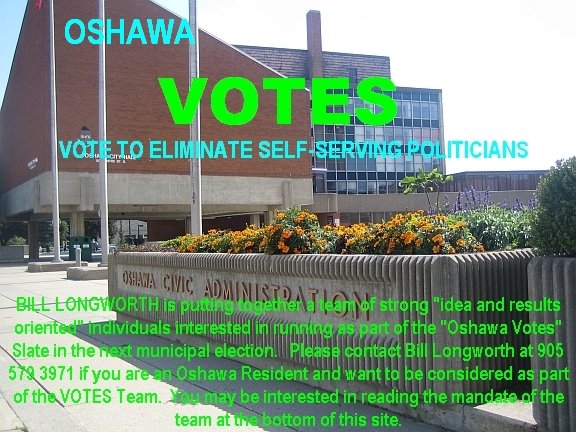Everyone wonders why the plebiscite question was asked...and so you are not alone in this!
There had been no dissatisfaction ever publicly expressed about ward voting and so it is a mystery why the politicians ever felt it necessary to put the plebiscite question on the ballot.
The rationale given for asking the question was very juvenile..."I thought it was just about time the question was asked."
When pressed, the councillor stated that he felt, "Oshawa was just getting too large for ward voting." This is ludicrous!
The councillor was dead wrong! The general vote that he wants to introduce into Oshawa is only useful in smaller communities of about 25,000 maximum (or about the size of an average Oshawa ward).
The fact that he responded with this answer proves that he didn't think out the idea at all.
More likely though...he did think out the rationale but it was one he could not use to justify the change to the public. You can hardly say publicly that you want an electoral system that virtually guarantees your council seat as long as you live. That just wouldn't "wash" with the public.
Every sensible person knows that the larger a jurisdiction is, the more it must be broken down into smaller units called wards to allow voters to have a chance of becoming informed about the merits of candidates, to insure that all areas of the city are represented on council, to keep election costs at a level that allows for funding of campaigns by "ordinary" people, and to keep politicians accountable. Ward voting allows for the removal of politicians if they are not adequately serving the people.
Oshawa's history with the general vote was that no Oshawa resident living south of King Street was elected to Oshawa for seven consecutive councils and that all change on council took place through the death or resignation of members.
Because all general vote councillors were competitors for city wide votes, council became a fractious and unproductive place as members competed for press to promote their name as name recognition was the only determinant in getting elected. Some politicians even took holidays in Florida during election campaigns and still got elected.
Because of council's unproductive nature, outsiders came to recognize that Oshawa was an unprogressive backwater where nothing happened. We developed a negative reputation and so the community was seen as being an undesireable place to live. With reduced markets for real estate, prices plummeted and developers of high end housing avoided us like the plague. The only development we could attract for many years was downscale and subsidized housing...again contributing to Oshawa's reputation.
We are just overcoming the bad reputation problem now and have been successful in attracting a lot of high end housing and a building boom as one of the fastest growing regions in Canada. This goes along with our "highest income" place in Canada according to stats released by Revenue Canada. We don't want to return to our sleepy past with the return of the general vote.
Oshawa's last general vote ballot was 11"X17" and contained close to 100 names. It was an impossible task for voters to make informed choices among the vast number of candidates and so they simply went down the ballot marking names they'd heard of...and these were the incumbents who had spent the entire term promoting their name recognition.
When we won ward voting in 1985, half of the general vote council got defeated because it takes a different kind of politician to be elected in ward voting. It takes a politician that relates to people and serves them.
Subscribe to:
Post Comments (Atom)


No comments:
Post a Comment